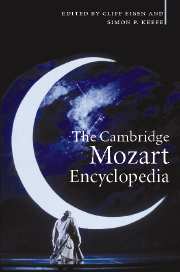Book contents
- Frontmatter
- Contents
- Contributors
- Preface
- A–Z general entries
- A
- B
- C
- D
- E
- F
- G
- H
- I
- J
- K
- L
- M
- N
- O
- P
- R
- S
- T
- U
- V
- W
- Z
- Appendix 1 Worklist
- Appendix 2 Mozart movies (theatrical releases)
- Appendix 3 Mozart operas on DVD and video
- Appendix 4 Mozart organizations
- Appendix 5 Mozart websites
- Index of Mozarts works by Köchel number
- Index of Mozarts works by genre
- General index
D
from A–Z general entries
Published online by Cambridge University Press: 05 June 2012
- Frontmatter
- Contents
- Contributors
- Preface
- A–Z general entries
- A
- B
- C
- D
- E
- F
- G
- H
- I
- J
- K
- L
- M
- N
- O
- P
- R
- S
- T
- U
- V
- W
- Z
- Appendix 1 Worklist
- Appendix 2 Mozart movies (theatrical releases)
- Appendix 3 Mozart operas on DVD and video
- Appendix 4 Mozart organizations
- Appendix 5 Mozart websites
- Index of Mozarts works by Köchel number
- Index of Mozarts works by genre
- General index
Summary
Da Ponte, Lorenzo (b. Ceneda, 10 Mar. 1749; d. New York, 17 Aug. 1838) Italian librettist; Mozart's collaborator on Le nozze di Figaro (1786), Don Giovanni (1787) and Così fan tutte (1790). His picaresque lifestyle took him from his birthplace, Ceneda (now Vittorio Veneto), through Venice, Vienna and London to New York.
Da Ponte was born Emmanuele Conegliano, adopting the name of the Bishop of Ceneda on his family's conversion from Judaism to Christianity. Like his friend Casanova, he was a raffish figure plagued by scandal at every turn. After being exiled from Venice, he worked with the poet Caterino Mazzolà in Dresden before moving to Vienna in late 1781 (Mazzolà recommended him to Antonio Salieri), where he attracted the favour of Emperor Joseph II. When the Emperor abandoned his pursuit of German opera and revived the Italian company at the Burgtheater, in 1783, Da Ponte was appointed the main poet to the theatre. His subsequent involvement in the remarkable flowering of opera buffa in Vienna in 1783–90 and his collaborations with Martín y Soler(Il burbero di buon cuore, Una cosa rara), Salieri (Il ricco d'un giorno, Axur, re d'Ormus), Mozart and others made him the most significant librettist of his generation.
- Type
- Chapter
- Information
- The Cambridge Mozart Encyclopedia , pp. 131 - 151Publisher: Cambridge University PressPrint publication year: 2006

